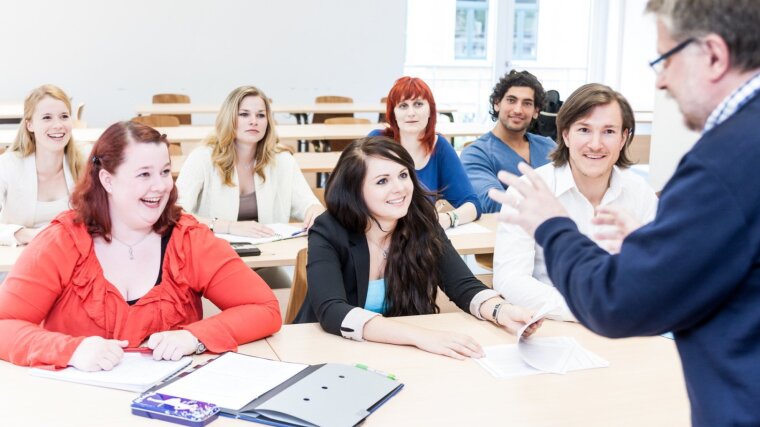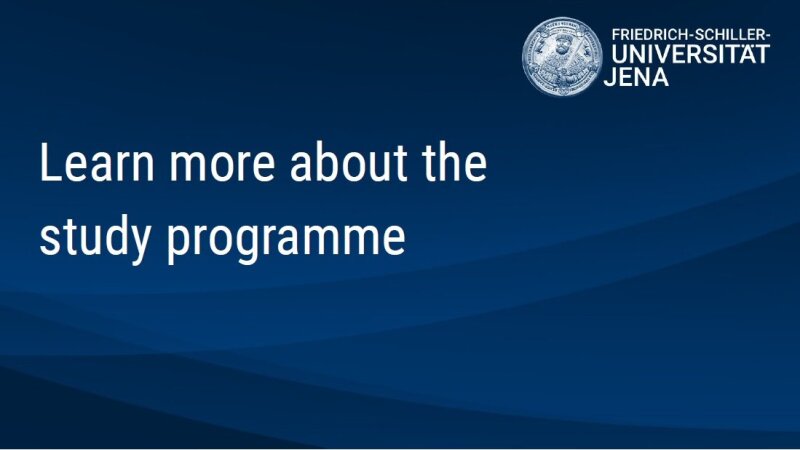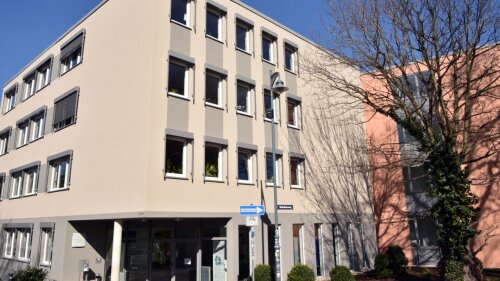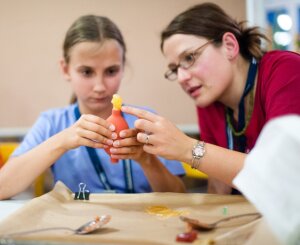
Programme content
‘Every day is a school day!’—We have probably all heard this saying at one time or another. The foundations for access to education are laid in childhood. This upbringing and education should then encourage people to continue learning on their own in adulthood—ideally throughout their lives. A long process and a broad subject area! This is precisely where educational science comes in.
How do we educate children properly? What do they really need? How can we support adolescents in their development? What is good education anyway? And how can we successfully support people with different learning speeds? In the course of your studies, you will deal with the theory and practice of education and upbringing as well as with the prerequisites, conditions and limits of pedagogical action. The focus is on people's entire lives, more or less from birth to death. You will analyse how people orient themselves and develop in the social environment, and how you can help shape it yourself.
In doing so, you will also take a look back at history: Specifically, you will deal with the educational realities and ideas of the last decades. During your studies, you will also reflect on educational facts and problems and work on various tasks. You will use relevant theories and methods of educational science. The focus is on the fields of adult education and social education / social management.
Doesn't that sound interesting? But beware! This study programme does not train you to be a teacher at schools or an educator, but rather a pedagogical researcher. As a result, this degree will open many professional doors for you.
placeholder image — Platzhalter
Picture: Sophie BartholomeStructure
major subject
Graphic: Sophie BartholomeThe bachelor's degree is the first professional qualification. The standard period of study is six semesters, during which various forms of courses (e.g. lectures, seminars or practical courses) are offered for the individual modules.
A multi-subject bachelor’s programme consists of a major subject with 120 credit points (CP for short; 1 CP = 30 hours for attendance, preparation and follow-up work, private study, assessed coursework and examinations) and a minor subject with 60 CP.
You can combine the major subject ‘Educational Science’ with all minor subjects offered at the University of Jena. The programme comprises ten compulsory modules and three required elective areas.
How might your degree programme shape up?
The following table shows the possible structure of your studies in the major subject ‘Educational Science’:
| 1st semester | 2nd semester | 3rd semester | 4th semester | 5th semester | 6th semester |
| Introduction to Pedagogy – General Basic Concepts of Educational Science (10 CP) |
Educational Research (10 CP) |
Bachelor thesis (10 CP) |
|||
| Research Methods (10 CP) |
Required elective area I* (10 CP) |
||||
| Learning, Development and Socialization (Educational Psychology) (10 CP) |
Required elective area II* (10 CP) |
||||
| Framework of Education –Socio-educational Basics (10 CP) |
General Pedagogy (10 CP) |
||||
| Subject-specific key qualification (5 CP) |
Internship (20 CP) |
||||
| Project of approx. 100 hours or an offer from the catalogue of General Key Qualifications (5 CP) | |||||
Abbreviations: CP = credit points
* You can choose between the following three required elective areas: Individual Development Processes, Social Pedagogy of the Ages and Locations, and Adult Education. Each area comprises two modules of five CP each.
More detailed information can be found in the module catalogue for the study programme [in German]External link.
Why study in Jena?
- High practical component: You will apply the methods you have learned during the integrated practical phase. Thanks to systematic supervision, challenges and problems are reflected upon with regard to case-related understanding and professional action.
- Research-oriented: We do not only teach aspects of methodology and statistics in an application-oriented way, but also directly relate them to current research activities.
- Possibilities without borders: Experience internationality! The University attracts students and scientists from all over the world with its appealing conditions and shapes Jena's character as a future-oriented and cosmopolitan city—ideal conditions for international prospective studentsmp4, 55 mb.
- Adventures abroad: If you dream of spending a semester abroad, you can easily make it come true. Our University has a worldwide network of partner universities—in Finland, Austria, Poland, Spain or Hungary, to name but a few.
What can you do after your studies?
Areas of employment for graduates
With this degree, you can work in child and youth welfare, for example.
Image: Christoph Worsch (University of Jena)- child and youth welfare (pre-school and extracurricular education)
- youth social work
- schools (school social work, after-school and recreational pedagogy)
- vocational education
- adult education (training and continuing education, political education)
- care for the elderly
- media and cultural education (media education, theatre education, public relations)
- health promotion
- work with disabled people
- intercultural work
Downloads and links for the degree programme
What are we looking for in prospective students?
- interest in people as learning and developing beings as well as in learning processes
- willingness to thoroughly examine scientific texts
- social competence, empathy and emotional intelligence
- communication skills and language competence
To study Educational Science as a major subject, you have to complete a pre-study internship in a field of pedagogical activity amounting to 240 hours. If necessary, you may also do this internship during your first year of study.
Admission requirements
-
University entrance qualification
A university entrance qualification, such as a general secondary school leaving certificate, is required for admission onto the study programme.
More information on university entrance qualifications can be found here.
-
Language requirements
Admission and language requirements for applicants of foreign nationality and without German Abitur: www.uni-jena.de/en/study-orientation-international
Room 301
Am Planetarium 4
07743 Jena
Google Maps site planExternal link
Bachstraße 18k
07743 Jena
Telephone hours:
Mondays and Fridays (9:00 – 11:00)
Wednesdays (13:00 – 15:00)
The ASPA is primarily responsible for students in the Faculty of Social and Behavioural Sciences, the Faculty of Arts and Humanities, and the Faculty of Theology.
Postal address:
Akademisches Studien- und Prüfungsamt
Fürstengraben 1
07743 Jena
Am Planetarium 4
07743 Jena
Google Maps site planExternal link
University Main Building / SSZ
Fürstengraben 1
07743 Jena
Google Maps site planExternal link
Office hours:
The Central Student Advisory Service will be closed from 22 December 2025 to 2 January 2026. We will be happy to assist you again from 5 January 2026!
We offer consultations in person, by telephone, and via Zoom. You can make an appointment by calling us on +49 3641 9-411111 (Mondays to Fridays from 9:00 to 11:00) or outside these office hours on +49 3641 9-411200. You can also use our remote help desk.
Consultation hours:
Mondays, Tuesdays, Thursdays and Fridays (9:00 to 12:20), Tuesdays (14:00 to 18:00), and Wednesdays and Thursdays (14:00 to 16:00).
Video chat: To the video chat – Zoom Videochat ZeitenMondays to Fridays (12:30 to 13:00) Password ZSB2020 Data protection informationpdf, 101 kb
University Main Building, Room E065
Fürstengraben 1
07743 Jena
Google Maps site planExternal link
Opening hours:
Information Desk (UHG; Room E0.65)
Mondays (10:00 – 12:00)
Tuesdays (13:00 – 15:00)
Wednesdays (10:00 – 12:00)
Thursdays (13:00 – 15:00)
Fridays (10:00 – 12:00)
You can also use our remote help desk at
www.uni-jena.de/service-ssz
or send us your enquiries by post.
Telephone hours:
Mondays to Fridays
(9:00 – 11:00)
Postal address:
Friedrich-Schiller-Universität Jena
Studierenden-Service-Zentrum
07737 Jena
University Main Building
Fürstengraben 1
07743 Jena
Google Maps site planExternal link



